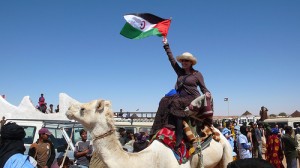
Blockades stopping fresh food from entering Melilla by a Moroccan group in mid-August were highly inconvenient for the inhabitants of this North African enclave belonging to Spain. However, the protest itself –against allegedly abusive and racist behaviour by Spanish police on the border between the city and Morocco– paled in comparison to the political repercussions of the episode and hinted at the complex and sensitive nature of the relationship between these two countries.
The two short blockades, which stopped trucks carrying perishable foodstuffs from entering the city, each lasted little more than a day and the issue appears to have been closed following a meeting between Spanish Interior Minister Alfredo Rubalcaba and Morocco’s King Mohammed VI. The activists organising the protest seemed to enjoy the tacit backing of their king, given that their action came on the back of a flurry of five official complaints by Rabat about alleged mistreatment of Moroccans by Spanish police on the border.
A roomful of baggage –recent and distant– weighs down bilateral ties between Spain and Morocco. The African country has regularly called for Melilla and Spain’s other African territory, Ceuta, to be “de-colonised”. This is a demand Spain ignores partly on the grounds, it says, that Morocco as such did not exist when the territories were seized in the 15th century.
Morocco’s hopes of reclaiming Ceuta and Melilla may be unrealistic, but they are not necessarily an obstacle to smooth relations with Spain. While in other foreign policy areas the Socialist government of José Luis Rodríguez Zapatero has been ineffectual or lightweight, it has worked hard to improve ties with Rabat following the disastrous policy of José María Aznar on this front. In his frenzied determination to “take Spain out of the corner of history”, Aznar mobilised the armed forces in an absurdly overblown operation to take back the islet of Perejil from a handful of Moroccan soldiers in 2002.
In tolerating the recent blockade, Rabat might have been agitating for more EU funding, or merely seeking to distract attention from domestic strife.
Impasse in the Sahara
However, the issue most likely to have sparked the Melilla blockade is Western Sahara. Spain withdrew from the territory situated between Mauritania and Morocco in 1975, and the latter subsequently moved straight in to occupy it, which it has done ever since. Meanwhile, the Polisario Front, a Saharawi rebel organisation, seeks independence for Western Sahara.
As the territory’s former colonist, Spain is a key player on the Sahara issue, which has drawn mediation by the UN to no avail. Morocco has offered to cede Western Sahara semi-autonomous status (a proposal that enjoys lukewarm backing from Spain), while the Polisario want a referendum on independence. This impasse could well be behind Morocco’s recent disquiet, as it seeks to pressure Spain to throw its weight behind the semi-autonomous plan.
A speech by Mohammed VI on August 20 in which he called for a “clear and precise” route map for the “advanced regionalisation” of the country’s southern provinces made clear his concern about the future of Western Sahara.
However, while the Melilla blockade brought to the surface some simmering bilateral issues, in Spain it became an acrimonious topic on the domestic front. With many politicians on holiday when the protests took place, it was all too easy for the government to look slow and unresponsive. Similarly, it was all too easy for the opposition Popular Party to exploit the episode to its full. When party leader Mariano Rajoy complained that the government had been “weak” and had “disappeared” on this issue, he was making use of a classic line spun by Spain’s conservatives: the Socialists can’t be trusted to look after Ceuta and Melilla, the same way they can’t be trusted to fight ETA terrorism. This strategy may work among some voters, although it makes for a lack of political unity –and maturity– on issues such as foreign policy and ETA.
“Harassment and laissez-faire”
The most concrete proof that the PP was shamelessly using the issue as a political football was the visit by Aznar himself to Melilla, in a supposedly “independent” capacity at the height of the blockade tensions. The grinning, khaki-clad former prime minister shook hands with locals, met with politicians and attacked the fact that Melilla was exposed to a contrasting mixture of “harassment and laissez-faire”. That visit was provocative, as was another by Esteban González Pons, a senior figure in the PP, and the Socialists rose to the bait.
“Theatre, pure theatre,” tutted Socialist spokesman José Antonio Alonso. “You lot are also irresponsible when it comes to foreign policy. Behave yourselves. You have taken advantage of the summer holiday by sticking your foot in your mouth in a theatrical manner.”
Alonso was right, although the Socialist government might reflect on what looked at times like an administrative power vacuum in Madrid in mid-August at a sensitive time, economically and politically speaking.
But while the Aznar visit gave the PP a few political points, it also highlighted a longer-term conundrum for the party: why does this man continue to cast such a huge shadow over the opposition, six years after stepping down as prime minister? His Melilla visit utterly dominated the headlines, relegating Rajoy’s own PP leadership committee meeting to a news footnote.
In the wake of such a strange, slightly mysterious conflict, perhaps the most tangible idea we are left with following the Melilla crisis is that one man can be such a problem, not only for Spain’s relations with Morocco, but also for the Spanish government and his very own opposition party.
Leave a Reply
You must be logged in to post a comment.